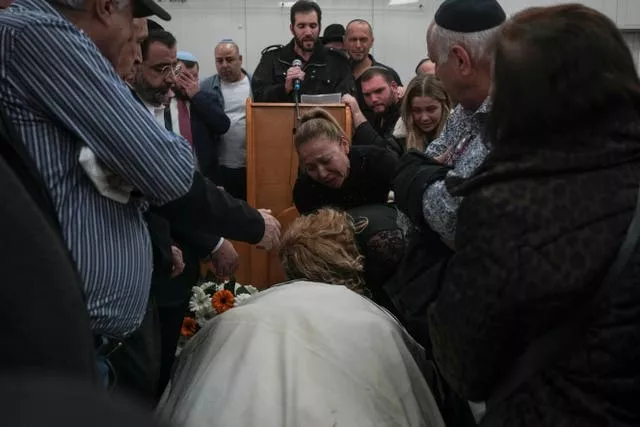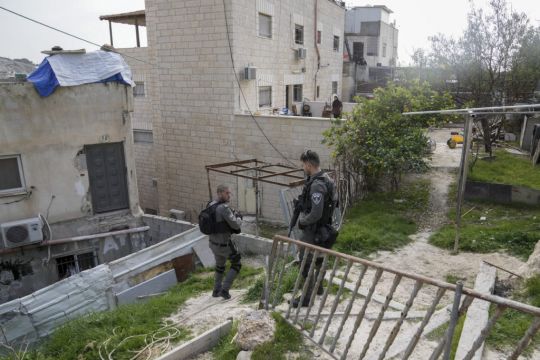Israel has sealed off the home of an east Jerusalem man who killed seven people outside a synagogue.
It marks a preliminary step ahead of the expected demolition of the building – and comes as two Palestinian men died from Israeli gunfire.
Israel's prime minister Benjamin Netanyahu’s Cabinet has also approved an order to seal the home of a second Palestinian attacker — a 13-year-old boy who wounded two Israeli men in east Jerusalem on Saturday.
His Cabinet also took steps towards approving other punitive measures against the families of Palestinian attackers, including potentially stripping them of citizenship rights and deporting them.
The moves by Israel, along with escalating violence, further raised tensions as US secretary of state Antony Blinken landed in the region.
Mr Blinken’s high-ware diplomatic act, focused largely on restoring calm, begins on Monday after a brief visit to Egypt.
Earlier on Sunday, Israeli police sealed up the east Jerusalem home of a 21-year-old Palestinian attacker who killed seven people and wounded three outside a synagogue on Friday night during the Jewish sabbath.
The attacker was shot and killed by police.
“We sealed the home of the terrorist who carried out the horrendous attack in Jerusalem and his home will be demolished,” Mr Netanyahu told his Cabinet.
“We are not seeking an escalation but we are prepared for any scenario. Our answer to terrorism is a heavy hand and a strong, swift and precise response,” he said.
The planned demolition is among a series of punitive steps, including plans to “strengthen” its West Bank settlements, announced by Israel in the wake of the twin shootings.

Palestinians, meanwhile, reported dozens of attacks by Jewish settlers in the occupied West Bank. The most serious took place in the Palestinian town of Turmus Ayya, where the official Wafa news agency quoted residents as saying settlers torched a car and set a home on fire.
Lt Col Richard Hecht, a military spokesman, called the incident “disgraceful” and said the military was taking it “very seriously” as it investigated.
Later on Sunday, Mr Netanyahu’s office said the Cabinet would seal the family home of the 13-year-old attacker as well.
Israel typically only demolishes attackers’ homes in deadly attacks.
The boy’s victims were both badly hurt but survived.
His office also said the Cabinet is pushing ahead with plans that could strip residency and citizenship rights of the families of Palestinian attackers and potentially deport them to the occupied West Bank.
Such moves have been condemned by human rights groups as collective punishment.
Israeli police released footage of Israeli army engineers welding metal plates over the windows of the home of the first gunman and welding the front door shut.
Police said the attacker, identified as 21-year-old east Jerusalem man Khairy Alqam, was killed in a shootout with officers on Friday night after fleeing the scene in the predominantly ultra-Orthodox east Jerusalem settlement of Neve Yaakov.

Relatives said Alqam’s grandfather was killed in a 1998 stabbing in Jerusalem. The killing remains unsolved but a Jewish extremist was arrested in 2010 in connection with a string of attacks on Palestinians. He was released and charges were not pressed.
Musa Alqam, the gunman’s father, said he has no idea if his son was motivated by revenge. “I don’t know how he planned what he did,” he said.
The suspect in the 2010 arrest was assisted by Itamar Ben-Gvir, who is now Israel’s national security minister. At the time, Mr Ben-Gvir was a far-right activist who accompanied the suspect to court.
More funerals for the victims of Friday’s shooting, the deadliest attack on Israelis since 2008, were scheduled to take place on Sunday.
Israeli media identified one of the dead as a Ukrainian healthcare worker, Irina Korlova. The Ukrainian Embassy confirmed one of the victims of the shooting was a Ukrainian citizen.
The weekend shootings followed a deadly Israeli raid in the West Bank on Thursday which killed 10 Palestinians, most of them militants. In response, Palestinian militants in the Gaza Strip fired a barrage of rockets into Israel, triggering a series of Israeli airstrikes in response.
The deaths of two more Palestinians on Sunday raised the Palestinian death toll from fighting this month to 34.

The Palestinian Health Ministry said an 18-year-old Palestinian man who was shot by a security guard next to the West Bank settlement of Kedumim died on Sunday. The Israeli military said a settlement security guard identified a man armed with a pistol outside the settlement and shot him.
The ministry also confirmed the death of a 24-year-old Palestinian man who was hurt in last week’s military raid in the West Bank town of Jenin. There was no immediate claim of his affiliation with a militant group.
Mr Netanyahu on Sunday repeated his vow to “strengthen the settlements” in the occupied West Bank. He said doing so is aimed at “sending a message to the terrorists that seek to uproot us from our land that we are here to stay”.
Israel captured the West Bank, along with east Jerusalem and the Gaza Strip in the 1967 Middle East war. It has built dozens of settlements in the West Bank and east Jerusalem, now home to more than 700,000 Jewish settlers, since.
Most of the international community, including the United States, considers the settlements an obstacle to peace with the Palestinians, who seek the West Bank as the heartland of a future independent state. A settlement announcement could lead to a tense visit with Mr Blinken.
In Cairo, Mr Blinken opened his Middle East tour by speaking with students at the city’s American University before he holds talks with Egyptian officials on Monday. He is then due to travel to Israel for talks with Israeli and Palestinian officials.







